Metropolitan Alexy. Russian Richelieu under Dmitry Donskoy
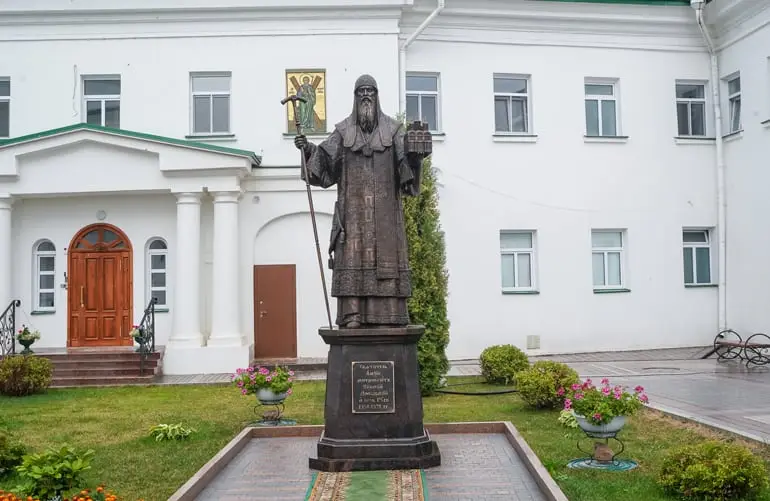
Monument to Saint Alexy in the Nizhny Novgorod Annunciation Monastery
Metropolitan Alexy actually ruled the Moscow principality from 1360 until his death in 1378. However, he is not very well known in our country, since he remains in the shadow of Dmitry Donskoy. Dmitry became the Grand Duke of Moscow at the age of 9, but even after reaching adulthood, he was only the Minister of Defense in the government headed by Alexy. But it was Dmitry Donskoy who has long been recognized as the main national hero of that era.
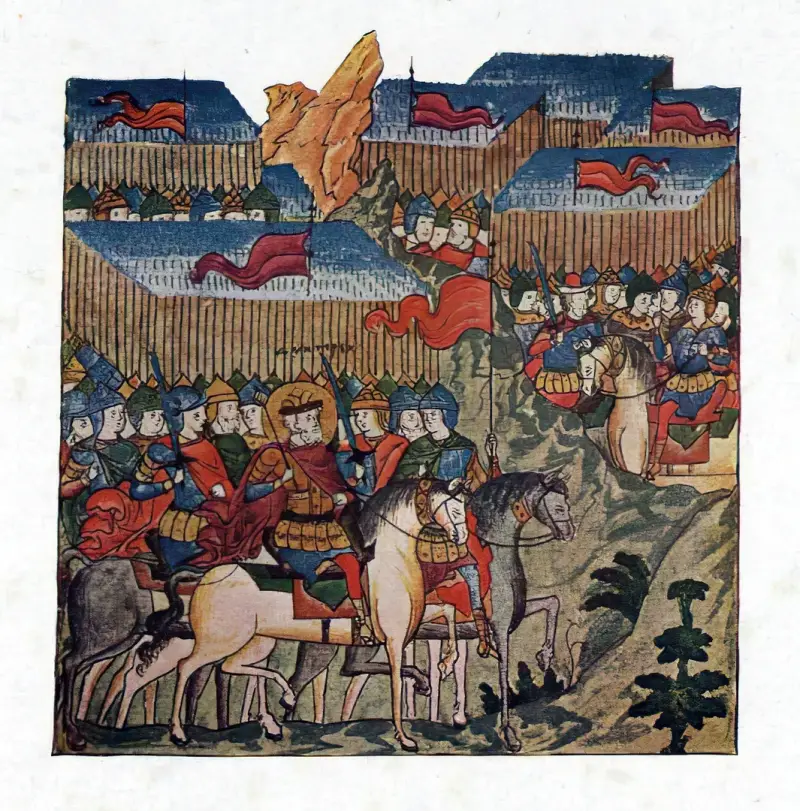
Dmitry Ivanovich Moskovsky (Donskoy) in front of the army. Old Russian miniature from the manuscript “The Life of Sergius of Radonezh”
Meanwhile, left without the guardianship of Alexy, Dmitry made a number of mistakes that led to the strategic defeat of his principality. After all, the victory on the Kulikovo field, which left such a deep mark on the Russian stories, unfortunately, is not so clear. We have to admit that, first of all, it turned out to be beneficial to Mamai’s rival, Tokhtamysh, with whose accession to the Golden Horde the period of the Great Zamyatn ended. Having ascended the throne of the now united state of the Jochids, this khan turned out to be so strong that he dared to challenge even his patron, the formidable Tamerlane. There could be no talk of resistance to him in Rus'. Just two years after the Battle of Kulikovo, Moscow was burned, Dmitry’s 10-year-old son became a hostage in the Horde, where he had to spend 4 years, the amount of tribute was doubled. And 2 years after the “Mamaev Massacre” (and 5 years after the burning of Moscow), Dmitry also lost Kolomna, which was conquered from him by Oleg Ryazansky. Only in 3 did Vladimir Andreevich Serpukhovskoy agree to recognize the right to the Moscow throne for the son of Dmitry Donskoy, Vasily. And in 1388, Dmitry died at the age of 1389, leaving Vasily I a very difficult inheritance. But all these are topics for other articles; today we’ll talk specifically about Metropolitan Alexy, whose position and role under Dmitry Ivanovich of Moscow can be compared with the position held by Armand Jean du Plessis de Richelieu under Louis XIII.
Nobody recognized Cardinal Richelieu as a saint, but the Russian Orthodox Church reveres Metropolitan Alexy as a “saint” - this is an order of holiness in which those who in earthly life bore the rank of bishop are “glorified.” By the way, please note that in the Saints the hero of the article is called Saint Alexy of Moscow, but officially he was the Metropolitan of Kyiv and All Rus'.
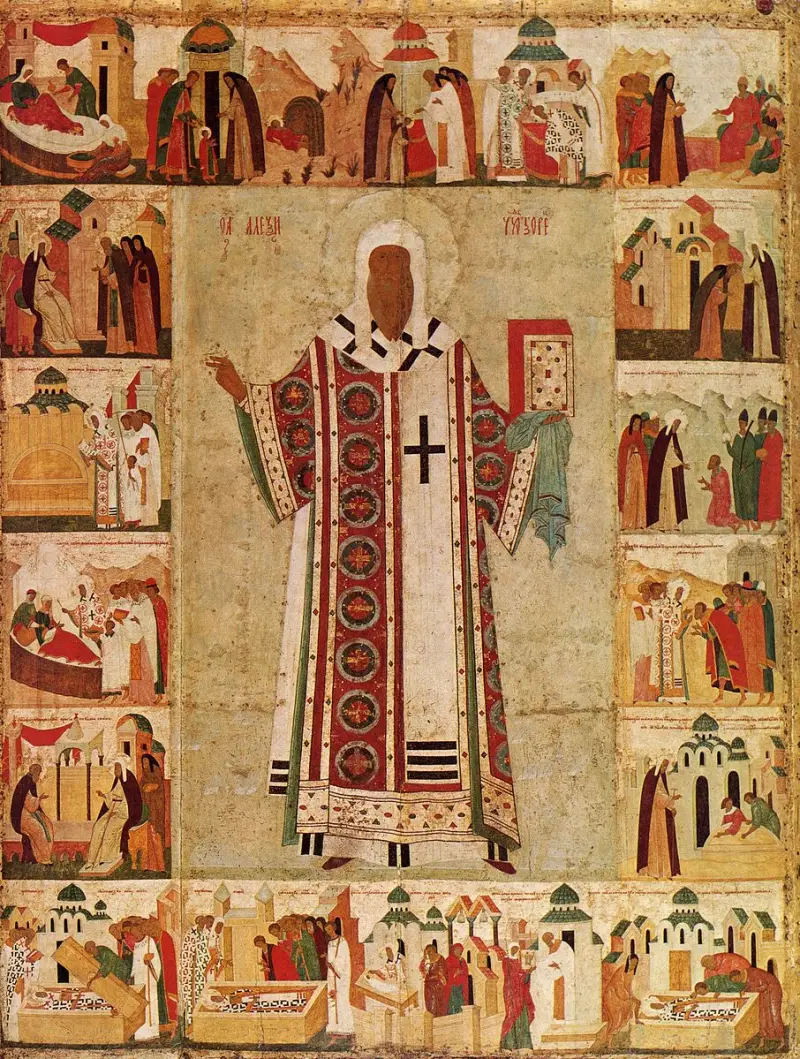
Dionysius. Saint Alexy, Metropolitan of Moscow, in his life. XV century
The origin of the hero of the article
One of the most prominent statesmen of the Moscow principality was the son of a Chernigov “political emigrant”. The Simionov Chronicle reports that his father, Fyodor Byakont, came out of "glorious and deliberate Lithuanian boyars, from the Russian country" However, it is believed that Fedor was the first boyar of the Chernigov land in his family. The name of his wife is known - Maria.
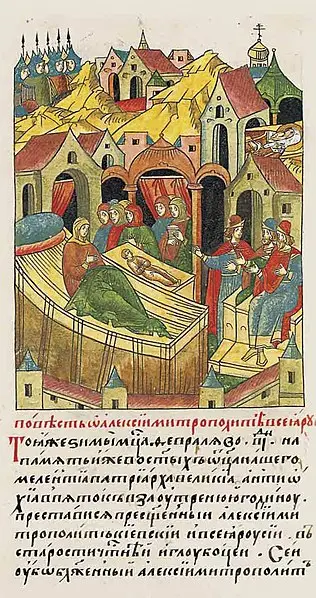
Birth of Alexy by Fedor Byakont's wife Maria. Miniature of the Facial Vault
The hero of the article was the eldest son of this couple, however, their other sons - Feofan, Matvey, Konstantin and Alexander, nicknamed Pleschey (probably “shouldered”), left their mark on history, becoming the founders of several noble families. Their descendants were, for example, the Ignatievs, the Zherebtsovs, but the Pleshcheevs were especially famous. Daniil Andreevich Pleshcheev, nicknamed Basman, for example, became the father and grandfather of the famous guardsmen of Ivan the Terrible.
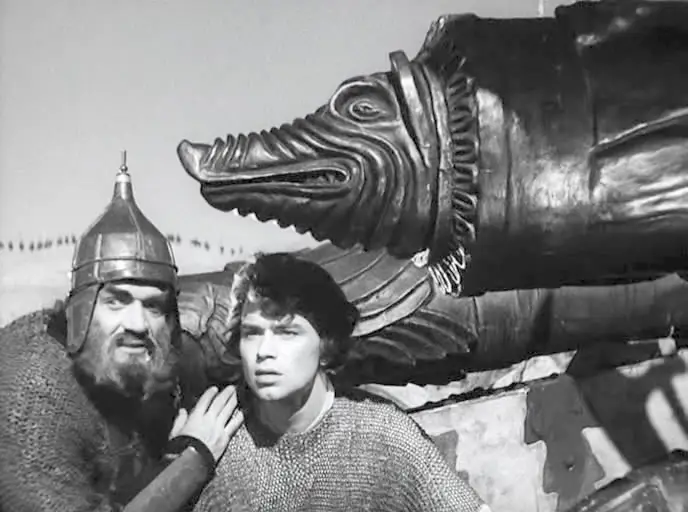
Alexey and Fyodor Basmanov, still from the film “Ivan the Terrible” (director S. Eisenstein, 1944)
Having moved to Moscow, Fyodor Byakont took a high position at the court of Prince Daniil Alexandrovich. Suffice it to say that "recipient in Baptism“Their eldest son, the future metropolitan, became Prince Ivan (later Grand Duke Ivan Danilovich Kalita). Byakonta was also highly valued by Daniil’s children, Yuri and Ivan. According to some reports, it was Fedor who managed the affairs of the Moscow principality during their trips to the Horde. Under Grand Duke Simeon Ivanovich Gordom Byakont became a worthwhile boyar (that is, the manager of the household of his court).
The worldly name of the eldest son of Byakont who interests us, born either in 1296 or in 1304, is Eleutherius. However, some believe that at baptism the future metropolitan was named Simeon, and Eleutherius was named when he was tonsured into the minor schema. And having already become a monk, he received the familiar name Alexy.
The legend says that at the age of 12 the boy went to set a snare for birds and, dozing off, heard a voice that, calling him Alexy, announced that he was destined to become "fisher of men":
This is how this episode is presented in the miniature of the Facial Vault:
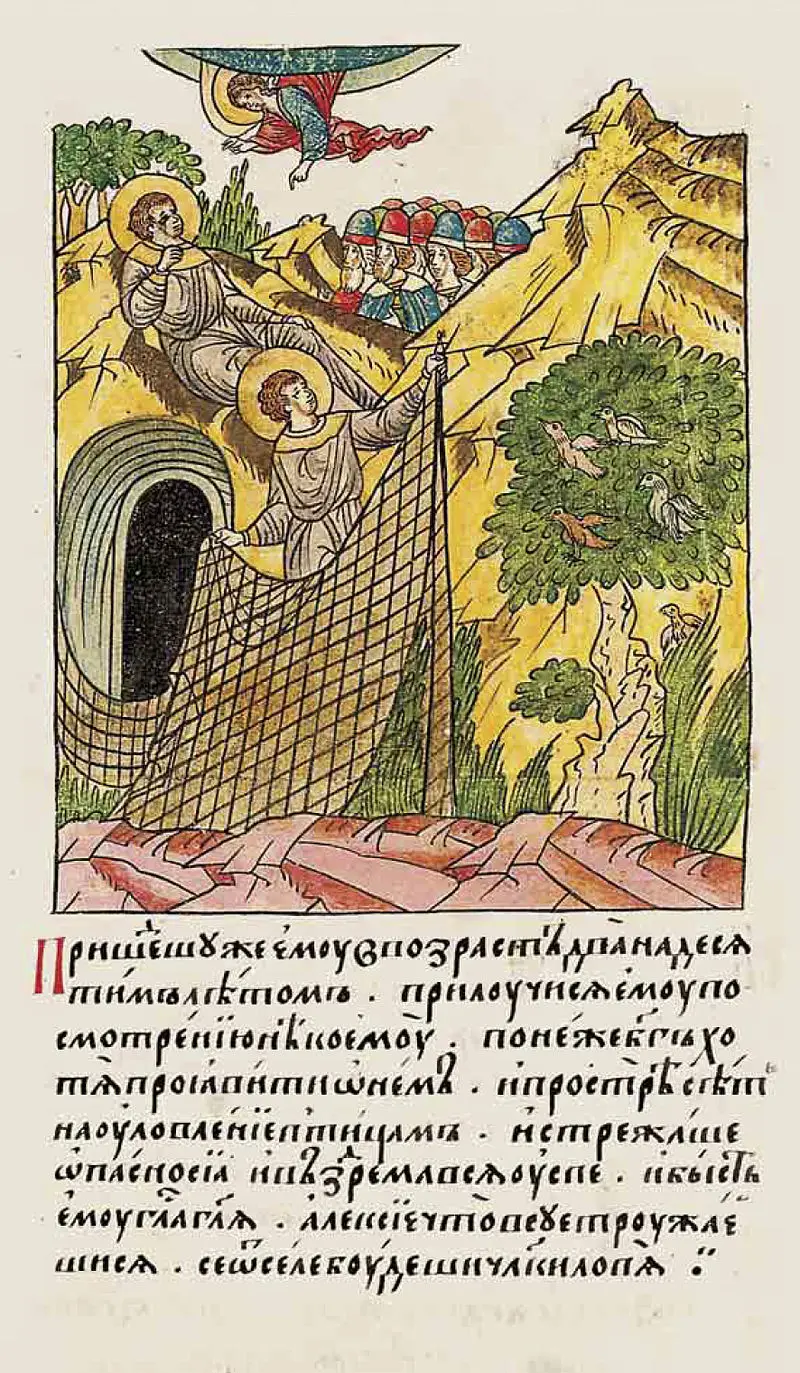
But there is another version, according to which the name with which our hero went down in history was given to him by the honor of Alexius the man of God - when he was tonsured as a monk at the Moscow Epiphany Monastery - founded at the end of the century, this monastery was the second in antiquity after the Danilovsky Monastery. During Alexy's stay there, there was a fire, and the future metropolitan took part in the construction of the stone single-domed Epiphany Cathedral.
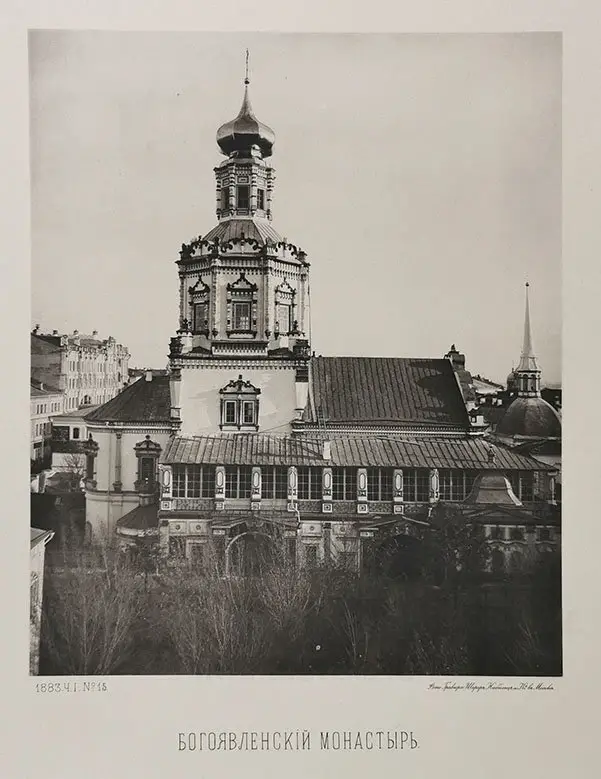
Photogravure “Epiphany Monastery”, 1883
Church career of Alexy
At the monastery, Alexy met the native (elder) brother of Sergius of Radonezh, Stefan, who was about 10 years younger than him. Previously, he was married and had two children, but went to the Khotkovsky monastery after his wife died. After the death of his parents, brother Bartholomew (the future Sergius) persuaded him to go to the forest on Mount Makovets, where the Trinity Church was built. However, according to the compiler of the Lives of Sergius of Radonezh and Stephen of Perm Epiphanius the Wise:
The common mentor of Alexy and Stefan was Elder Gerontius. Later, Stefan (not without the patronage of Alexy) became a hieromonk and, according to some sources, abbot of this monastery, confessor to Prince Simeon the Proud and Vasily Velyaminov of the Thousand, and maintained close relations with Metropolitan Theognost. Later, by the way, he returned to Makovets and came into conflict with his brother, claiming first place in the Trinity Monastery. After the intervention of the hero of the article, already a metropolitan, some of the monks left the monastery, founding the Assumption Simonov Monastery in Moscow, the son of Stephen and nephew of Sergius Fedor became its head. This monastery was very loved by Peter I’s elder brother, Tsar Fyodor Alekseevich, who even ordered the construction of royal chambers there, in which he periodically indulged in “the asceticism of monastic life».
But let's see what happened in the Epiphany Monastery in the first half of the 14th century. With his piety, Alexy attracted the attention of Metropolitan Theognostus.
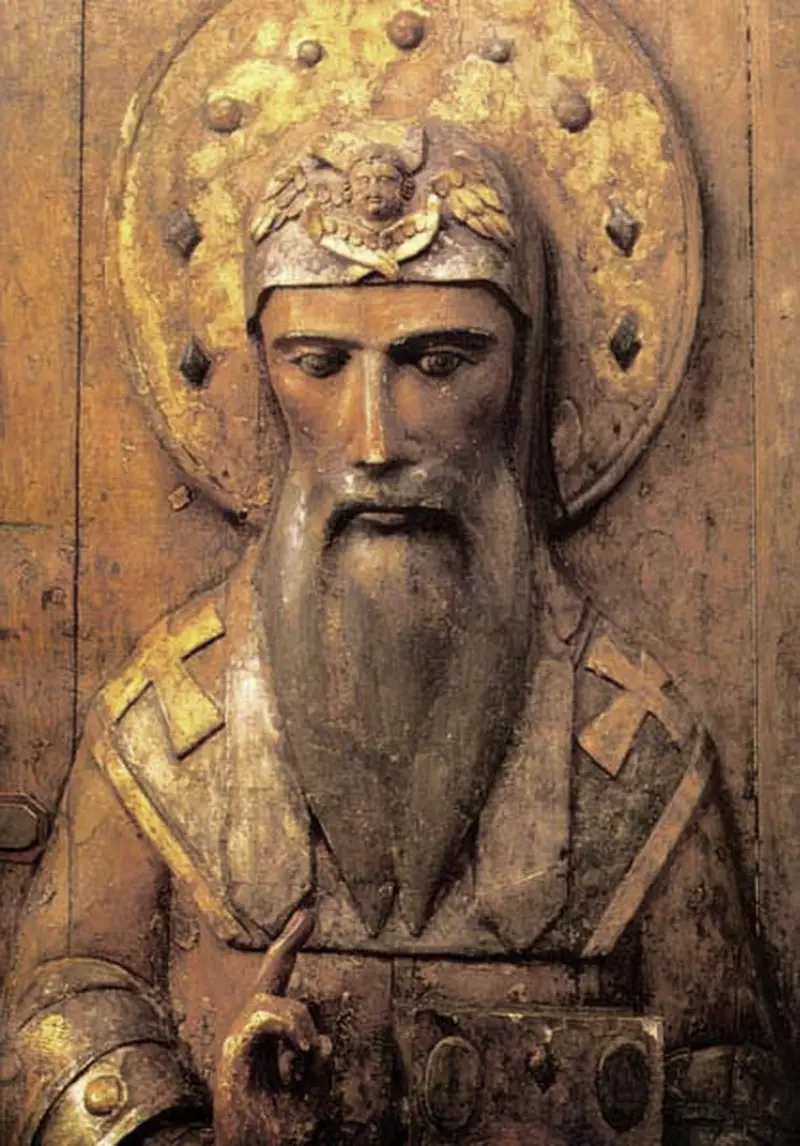
Theognostus, Metropolitan of Kiev and All Rus', wooden sculpture of the 17th century. Greek by nationality
Let us immediately note that the rank of metropolitan is second after patriarch. The metropolitan is, as it were, the vicar of the patriarch in the territory called the metropolis or metropolitan see. Until the middle of the 15th century, the Russian Church was subordinate to the Patriarchs of Constantinople, who appointed or confirmed the Metropolitans of Kyiv and All Rus'. And then they still had to receive labels from the Horde khans.
Alexy made such a good impression on Theognost that around 1344 he brought him closer to him, obliging him to “help him and judge church people in truth, according to sacred rules».
6 декабря 1352 года
In his spiritual letter, the dying Simeon the Proud appointed Alexy as an adviser to his younger brothers - the Grand Duke of Vladimir Ivan II the Red and Prince Andrei Ivanovich of Serpukhov. The cause of the death of this prince is called the “plague pestilence”, at the same time his sons Ivan and Semyon, his younger brother Andrei Ivanovich Serpukhovskoy and Metropolitan Theognost died from the “pestilence”.
After the death of Theognostus (March 1, 1353), Alexy went to Constantinople to be confirmed as the new primate of the Russian Church. During this journey, he almost drowned at sea during a storm. In memory of his salvation, later in Moscow he ordered the construction of the famous Spaso-Andronikov Monastery - in honor of the holiday that fell on the day when his ship reached the Golden Horn Bay. Currently, the historical and architectural reserve named after Andrei Rublev is located here.
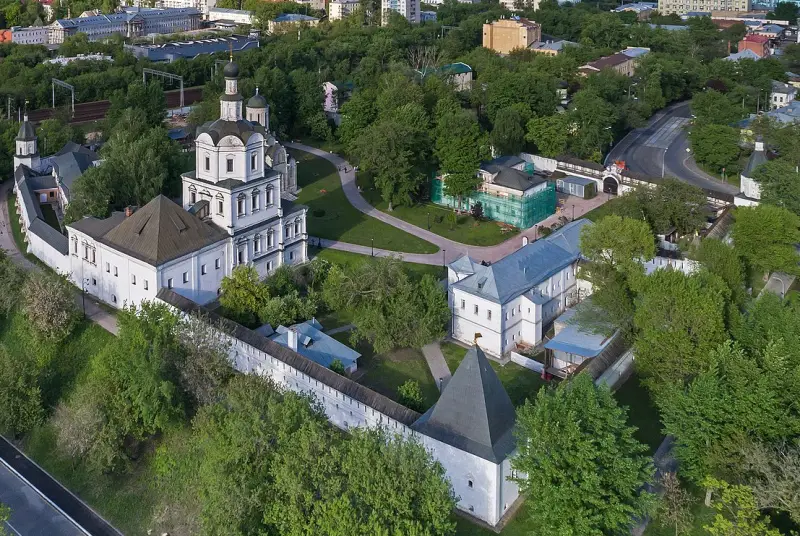
Spaso-Andronikov Monastery
Cash-strapped Greeks desperately bargained over terms of approval. Finally, on June 30, 1354, Patriarch Philotheus Kokkin signed the required document, and Vladimir was named as the seat of the metropolitans of Kyiv and All Rus'. This great diplomatic victory for Moscow greatly annoyed the Grand Duke of Lithuania Olgerd Gediminovich. At his request, in 1355, Patriarch Kallistos I of Constantinople restored the Lithuanian metropolis, which included the Polotsk and Turov dioceses (on the territory of Belarus) with its center in the city of Novogrudok. The Tver monk Roman, Olgerd’s protege, was installed as Metropolitan here. But the title of Metropolitan of Kyiv and All Rus' remained with Alexy, who in the fall of 1355 was forced to go to Constantinople again to resolve the issue of the boundaries of the metropolises. The fact is that the Pro-Lithuanian Metropolitan Roman, contrary to the agreements, extended his powers to the territories captured by Olgerd, including Kiev. Looking ahead, let's say that Metropolitan Roman tried to take control even of the Tver See, but in the winter of 1362 he died, and the dioceses he had captured again recognized the power of Alexy.
Trip to Horda
In 1342, power in the Horde was seized by Khan Janibek, who killed his two brothers. It is curious that in Russian chronicles this fratricide is called the “good tsar.” In 1343 and 1344 he fought against the Genoese of Kafa (Feodosia) and the Venetians of Tana (Azov). As a result, in 1345, these republics that hated each other even entered into an anti-Tatar alliance. In 1347, a peace treaty beneficial to the Italians was concluded. Janibek stopped the attempts of Prince Mubarek to separate its eastern territories (Blue Horde) from the Golden Horde and defeated him in 1352. He conquered the territory of present-day Azerbaijan from his Khulagid relatives. But during the 15 years of his reign, the Tatars came to Rus' only once - in 1347, when the city of Aleksin was captured and its surroundings were devastated.
In 1350, Janibek, at the request of the Grand Duke of Lithuania Olgerd, acted as an arbiter in his dispute with Simeon the Proud - and made a decision in favor of the Moscow Prince. From Olgerd, by the way, in the 1360s. Janibek suffered defeats: the Great Prince of Lithuania occupied Kyiv, Chernigov-Seversk and Volyn lands, and some other territories.
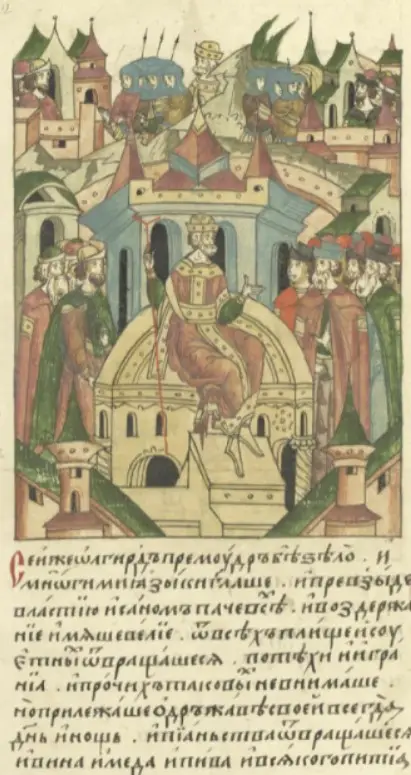
Olgerd on the Lithuanian throne, miniature of the Facial Vault
At the same time, the Lithuanians then demonstrated loyalty to the customs and traditions of the population of the conquered territories, acting on the principle:
It is not surprising that for some time the Grand Dukes of Lithuania quite seriously laid claim to the role of collectors of Russian lands. Conversion to Catholicism was fatal for them.
But let’s return to the “good king” Janibek, his relations with Russian tributaries and see that the khan then confirmed the privileges of the Russian Orthodox Church, including the liberation “from all tributes, extortions and violence from the authorities».
In August 1357, Janibek demanded that Prince Ivan the Red of Moscow send Alexy to him to treat his blind mother Taidula.
Let us clarify that the metropolitan was no longer supposed to go to Sarai-Bata, located on the banks of the Akhtuba in the territory of the modern Astrakhan region, but to the New Sarai (Sarai al-Jadid) or Sarai-Berke located to the north, which became the capital under Uzbek Khan. This was not at all the miserable and miserable dusty town shown in the 2011 film “The Horde”. The population of the new capital, according to various estimates, reached from 75 to 100 thousand people, the city was stretched along the river for a distance of over 10 km, its width is estimated at approximately 3,6 km. The Arab traveler Ibn Batuta, who visited Sarai-Berke in 1334, wrote about him:
This Barn had running water, fountains, and sewerage. In addition to the Khan's palace and the trading part, quarters were built inhabited by the Mongols, Yas, Circassians, Kipchaks, Arabs, Persians, Russians and Byzantines. In 1395 Sarai-Berke was completely destroyed by Tamerlane. It was rebuilt again in 1402, but it was already a shadow of the former majestic city. Around 1469, Afanasy Nikitin visited Sarai-Berke. In 1471, this city was plundered by the Vyatka Ushkuiniki. And in 1480 it was ruined by Prince Nozdrovaty-Zvenigorodsky and the Tatar prince Nur-Devlet - this happened at a time when the main forces of Khan Akhmat and Ivan III stood on the Ugra. And Sarai-Berke was finally “finished off” by the Crimean Khan Mengli-Girey in 1502.
In 1589, on the other bank, near the ruins of Sarai-Berke, the city of Tsaritsyn (modern Volgograd) was founded. The remains of the buildings of the former capital of the Golden Horde were dismantled and used for the construction of the Tsaritsyn fortress, the Astrakhan Kremlin (stone was transported there on barges), and simply houses in nearby villages and towns. But back in the XNUMXth century, old people talked about seeing the walls "so wide and thick that one could freely drive around them in a troika».
By the way, the aforementioned film “Horde” was filmed near the supposed site of the old capital - Saray-Batu, which, according to serious historians, is now under water, and in the area of the village of Selitrennoe - the ruins of another, smaller and insignificant city: the first mention of Saray-Batu dates back to 1254, and at the Selitrennoye settlement there are no layers of the XNUMXth century.
Let's go back to 1357. Khan Janibek wrote to Dmitry Donskoy’s father, Ivan the Red:
The Resurrection Chronicle states that during a farewell prayer service held in the cathedral Assumption Church (a small church on the site of the current cathedral), the candle standing at the tomb of St. Peter (the first Moscow saint, metropolitan under Ivan Kalita) was lit by itself:
Those present regarded this as a good sign. From the wax of this candle another was made, lit at the khan’s headquarters - during Alexy’s prayer in Taidula’s chambers.
The Khansha's blindness may have been psychogenic in nature. One way or another, the healing was successful.
Metropolitan Alexy heals Queen Taidula (the mark of the icon “Metropolitan Alexy with his Life”):
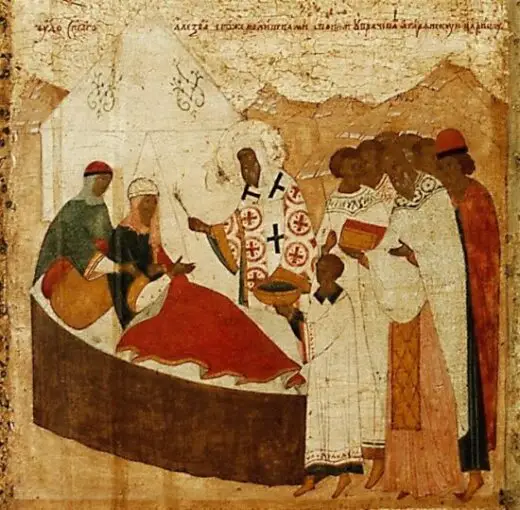
This is a painting by Y. Kapkov “Healing by Metropolitan Alexy Taiduly” (1830s), Khan Dzhanibek, mistakenly called by the artist her husband, sits next to his mother:
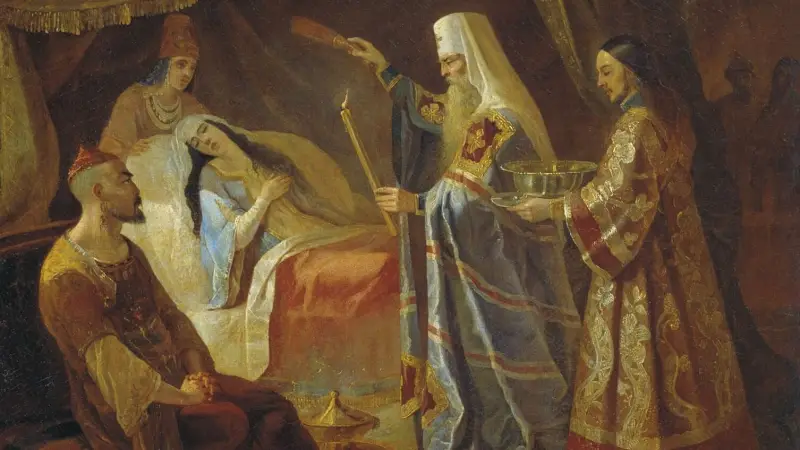
And this is how this episode is presented in the film “Horde”, 2011:
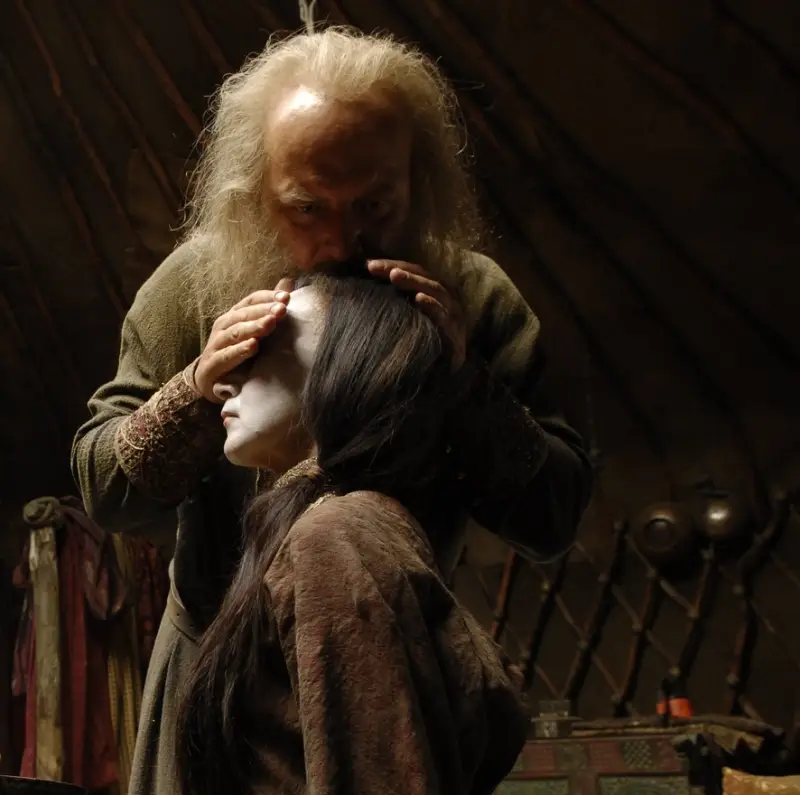
Taidula gave Alexy a gold ring, which was then hung up "at the image of the miracle worker Alexy, which is carried out during the great crucifixion]". On January 28, 1722, this relic, unfortunately, attracted the attention of Peter I. The Tsar ordered the ring to be transferred to the synodal sacristy, after which its traces were lost. A copper copy of that ring is now kept here.
In memory of this trip, the Monastery of the Miracle of the Archangel Michael in Khony was founded on the territory of the Moscow Kremlin in 1365, but was demolished in 1929-1932. Let us recall, by the way, that the clerk of the Chudov Monastery was Grigory Otrepiev.
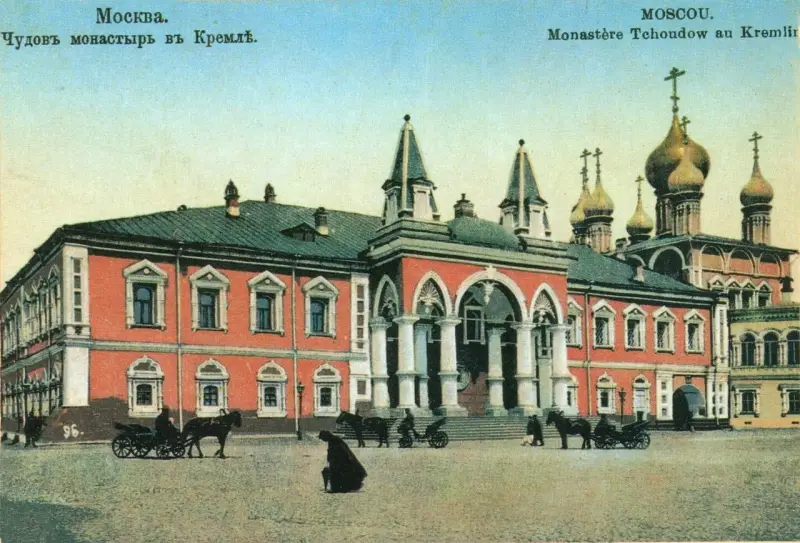
Miracles Monastery on a pre-revolutionary postcard
But let's go back to 1357. Soon after Taidula’s healing, Janibek was killed by one of his sons, Berdibek, whose daughter became the wife of the notorious Temnik Mamai (like Timur, he was the khan’s son-in-law - gurgen, a member of the khan’s family, but still had no rights to the throne of the Golden Horde). Khan Berdibek killed 12 of his brothers, the youngest of whom was 8 months old. He demanded an increase in tribute, and Alexy again went to the Horde for negotiations. With the support of Taidula, he managed to achieve a softening of the khan's demands, as well as a label confirming all the privileges of the Church he headed.
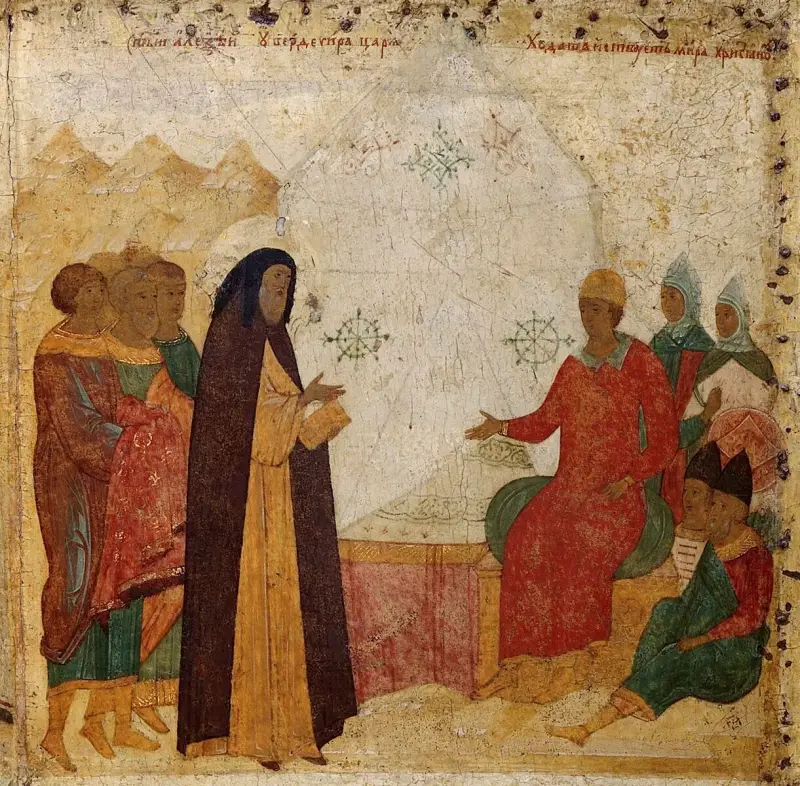
"Pacification" by Alexy Khan Berdibek
In 1359, Khan Berdibek was killed by a certain Kulpa, which marked the beginning of the famous “Great Zamyatna”, which lasted in the Horde until 1380. One of their khans set a kind of “anti-record” in 1361, remaining on the throne for only three days. The Great Zamyatnya “freed the hands” of the Novgorod ushkuinists, who until then had gone to Murman, Karella, Dvina land, Ustyuzhna and Belozerye. Now, sensing the weakness of the Horde, they began to sail down the Volga, burning and plundering the “infidel” (and sometimes Russian) cities. Large-scale campaigns of the Novgorod Ushkuiniki were recorded in 1360, 1363, 1366, 1369, 1370, 1371, 1374, 1391, 1392, 1393, 1409, 1417.
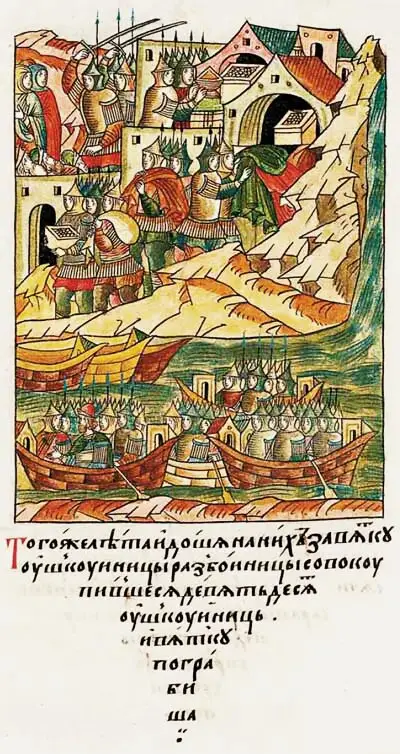
The caption for this miniature reads: “That same summer (1374), when the robber ushkuinis went down to Vyatka, ninety ushkuinis copied. And I’ll rob Vyatka.”
Let us add that this was only the beginning of that expedition. After Vyatka, the Ushkuiniki captured the Bulgar (for the third time), taking compensation of 300 rubles from the townspeople. Then they split up: 50 Ushkui went down the Volga to Sarai, 40 went up, robbing "all Zasurye and Markvash", after which they went "on horseback» again to Vyatka, plundering villages along the Vetluga River. And the next year, 1375, a gang of Ushkuiniks, led by certain Prokop and Smolyanin, plundered Kostroma, which was unsuccessfully defended by Alexander Fedorovich Pleschey, the younger brother of the hero of the article, Metropolitan Alexy. In this case, the balance of forces is striking: one and a half thousand ushkuiniks against a 5-strong government army. In general, the ushkuyniks of the “private military companies” of Mister Veliky Novgorod were very serious people.
In the next article we will continue our story and talk about the activities of Alexy as the de facto regent of the Grand Duchy of Moscow.
Information